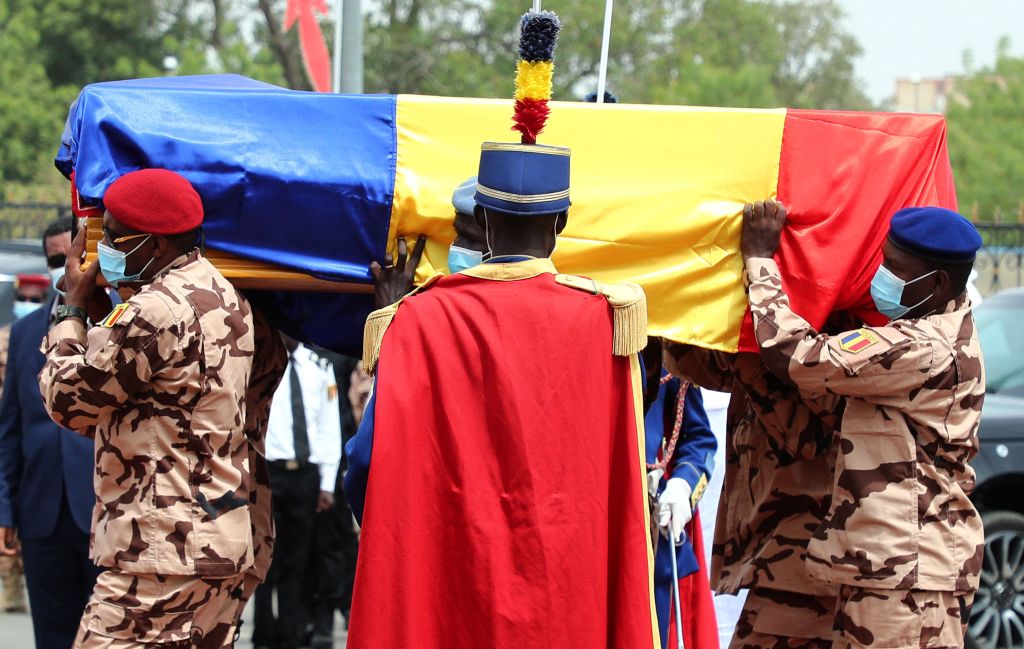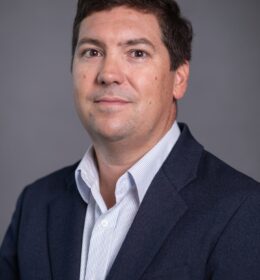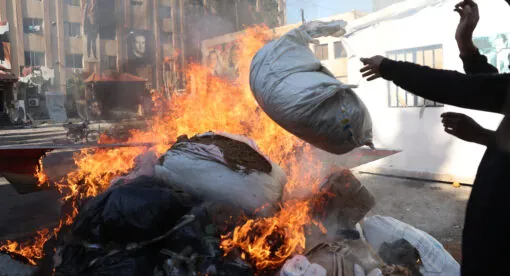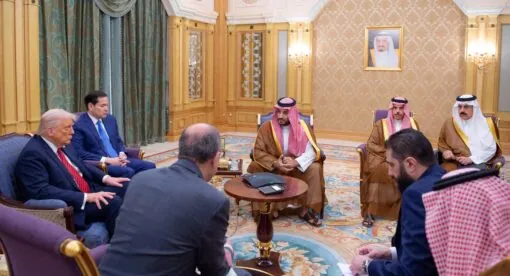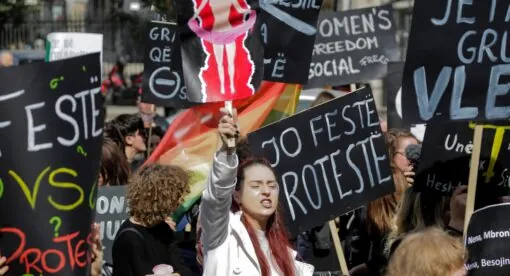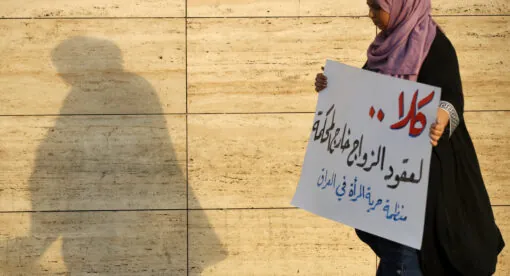Chad has never figured highly on Washington’s diplomatic agenda. Perhaps this is a curse of its own geography; it sits neither fully in the strategic Horn of Africa, nor entirely in the troublesome Sahel, nor in the perennially convulsed Great Lakes region. Chad is at a strategic crossroads, but straddling so many regional and bureaucratic fault lines, it is also an island unto itself.
With no abiding strategic interest to the United States, Chad’s internal politics have remained dominated by France since its independence. France continues to maintain one of its largest external military bases on the outskirts of the country’s capital, N’Djamena. From here, generations of French military officers have developed a fondness for the country as they have cycled through on obligatory tours and used the location to manage their ongoing counterterrorism efforts across the Sahel, pausing periodically to assist Chad’s leadership in putting down internal rebellions. Despite the announcement that France was moving the operational headquarters for its Sahelian counterterrorism operation, Operation Barkhane, to neighboring Niger, France is not giving up on Chad either. President Emmanuel Macron and Foreign Minister (formerly Defense Minister) Jean-Yves Le Drian have met with Mahamat “Kaka” Déby, the head of Chad’s Transitional Military Council and son of assassinated autocratic President Idriss Déby Itno, a combined six times since he came to power a year ago – an astounding number for a country ranked 163 out of 167 countries on the Economist Intelligence Unit’s annual Democracy Index.
For both Washington and Paris, Chad’s deployment of forces to push back the spread of Boko Haram from Nigeria’s lawless north and halt the encroachment westward of Islamic extremist groups from Mali, and its decision in recent years to stay out of Sudan’s fractious tribal politics (with whom Chadian Arabs share kinship across the Darfur region), have been reasons to quietly praise the government. While that praise rarely registers in public statements, owing to the country’s dismal record of internal abuse and infringement on democratic rights, it comes in a far more useful form for Chadian rulers: The steady drip of training and assistance to Chad’s Special Anti-Terrorism Unit in the form of combat training, vehicles and other non-lethal assistance has made Chad’s army a reliable fighting force abroad and a juggernaut at home.
But that Faustian bargain was upset in April 2021 when Libyan-based Chadian rebels succeeded, according to an official though disputed narrative, in assassinating Idriss Déby on the eve of his re-election after more than three decades in power. But rather than seeing the opportunity to respond to the demands of Chad’s long-suffering and democratically deprived population afforded by the surprise death of its longtime ruler, Washington has largely responded with a shrug, continuing to simply endorse the status quo and missing the opportunity to advance U.S. interests and values.
Indeed, neither Washington nor Paris has called the suspension of the constitution, the dissolution of Parliament, and the establishment of a self-appointed Transitional Military Council under Mahamat Déby a “coup.” Doing so could have endangered Chad’s willingness to fight the battles the West wants it fighting around the region – and the West’s support for Chad in those efforts – even though that choice comes at the expense of a possible democratic opening.
No realist would fault their approach. To say that the last few months of political and security developments among Chad’s neighbors have been turbulent understates the tectonic movements at play. In many respects, the rising incidences of military coups, exploding populations of internally displaced, rising state and non-state violence against civilians, and deleterious humanitarian situations cutting across Chad from Mali to Somalia reflect the changing geopolitical forces that are reshaping these regions and the wider world.
Sudan‘s moribund transition, once held up as a possible model for Chad and others seeking to shift from dictatorship to democracy, coupled with Mali‘s near total rejection of French and Western security cooperation – and their replacement with Russian mercenaries – has only reinforced in the minds of Chad’s backers the need to maintain stable and secure ties to the military government there, lest it also succumb to the malign actors preying on the region and circling the country, be they Russian mercenaries or Islamic extremists.
And while Chad’s backers have largely let pass the opportunity created by Idriss Déby’s death, allowing for the consolidation of power by his son, the Chadian people have not. Pro-democracy groups like Wakit Tama (Chadian Arab for “the time has come”) have stepped up their calls for a rejection of the business-as-usual politics with Paris, as well as for Mahamat Déby and his 15-member ruling council to hold tight to their pledged 18-month transition timeline.
A national dialogue, intended to serve as both reconciliation conference and constitutional convention for Chad’s countless tribal and religious factions, has been delayed on several occasions already as pro-democracy groups assess whether the junta is indeed acting in good faith and as armed factions negotiate the terms of their return to the country. The council on May 1 again delayed the start of the national dialogue in order to give more time to reach a peace deal with existing rebel groups to allow for their own participation in the convening.
For its part, the junta has paid just enough lip service to the country’s civilian-led future to keep domestic opponents guessing and African Union sanctions at bay. Last November, they emptied Chadian jails of dozens of political prisoners and began a modest opening of civic space that would not have been impossible under Déby the elder. Opposition politicians, like the young and charismatic Succès Masra, who heads the upstart Transformateurs party that was banned from last year’s presidential election, has restarted his campaign, this time filling the national stadium with supporters in the largest opposition political rally to date. Wakit Tamma, the pro-democracy civil society collective, has similarly held marches and protest rallies and has been invited to sit down with junta leaders to entice them into joining the national dialogue. Prominent political exiles, who previously feared for their lives under Deby’s regime, have returned to the country to accept the younger Déby’s offer of reconciliation.
Even rebels, whose armed opposition was the only means of expressing political dissent under the previous regime, have been extended amnesty by the junta, save for the Libyan-based Front for Change and Concord in Chad (FACT) rebels who claim credit for killing the elder Déby. And still, the FACT and others remain engaged with government leaders in a pre-dialogue that has convened in Doha, Qatar, to negotiate the terms of their participation in the national dialogue.
But while the political opening of the past months is necessary, it is by no means sufficient. While organizers of the national dialogue include respected opposition figures, Chad’s legacy of distrust is a lot to vanquish, and the junta, which is still populated by the same Zaghawa tribesman who surrounded Idriss Déby for so many years, remain firmly in place. The dealbreaker for opposition groups remains whether this clique will retain the right to run for elections when they are held at the end of the transition period or whether they will commit to stepping aside now. Unless they do, the opposition argues, their participation will only lend legitimacy to the junta’s attempts to extend their hold on power through only quasi-inclusive means.
Seeking to short circuit that argument, Mahamat Déby has declared the national conference a “sovereign” convening and asserted that the consensus view that emerges will be legally binding on the government, saying that if the sovereign dialogue determines that current officer holders are barred from holding future office, then that finding will be respected. But Chad’s history of political manipulation, and with Idriss Déby’s practice of contorting the outcome of his own sovereign national dialogue more than 20 years ago still fresh in the minds of many, the principal pro-democracy groups have thus far declared their intention to boycott the convening.
In a country where politics is traditionally practiced at the barrel of a gun, it is no surprise that the junta has thus far placed its greatest emphasis, literally and figuratively, on disarming armed groups and convincing them to come under the tent of dialogue. But as important as that is, it also only reinforces the traditional bias that only those few with guns get a seat at the table, while the many using their voices to demand change are left outside. That’s a mistake, but not one the junta is still capable of correcting. After all, it too is a product of the militarized political system it presided over for most of the country’s history.
This presents an important opening where Washington could bring its experience and credibility to bear in helping to prioritize the participation of civilian voices. But first, it requires Washington look beyond its near-term security interests, something it has struggled to do from Sudan to Mali. Such a move would send an important message to Chad and other similarly inclined countries across the region that security interests can be equally well protected under a civilian, democratic government as by the military.
But while some quiet efforts are being made to support Chad’s burgeoning democrats and civil society voices through funding and organization efforts, there is more Washington can do to set firm expectations with the junta about what it expects to see to ensure a credible process and outcome from the national dialogue.
In a visit to the country last month, U.S. Assistant Secretary of State for African Affairs Mary Catherine Phee welcomed the announced dialogue and elections to follow but set no clear signposts for how the U.S. would define success. Nor did Phee promote any engagement with leading civil-society or democratic opposition parties, choosing instead to promote meetings with the head of the junta and the chief of staff of the armed forces, praising “the critical role of Chad’s armed forces in regional security.”
Only U.S. Sen. Robert Menendez, chairman of the Senate Foreign Relations Committee, seems poised to capitalize on the once-in-a-generation opening toward democracy that Chad presents, noting in a letter to the State Department last month, “Now is the time for the U.S. to assert its leadership and influence in support of civil society voices in Chad advocating for credible elections and a transition to civilian governance in 2022.”
That should happen in a number of ways, but it will take some prioritization from the Biden administration that it has not shown with preoccupations in Ukraine and more pressing security and humanitarian crises from Mali to Ethiopia. But even modest diplomatic outlays could include high-level calls from U.S. Secretary of State Antony Blinken to Mahamat Déby making clear the democratic benchmarks the U.S. would need to see to restore previous levels of military assistance; higher-level engagement with prominent opposition parties to support their efforts to engage military leaders; and active support by U.S.-funded democracy and governance groups to assist in the organization and participation of the national dialogue. These efforts would carry enormous weight in Chad’s domestic political context so often overlooked by U.S. officials.
Many would argue that with political turbulence infecting the entire region, and with increasing threats to regional security, now is not the time to wager on a successful democratic transition in a place with no democratic tradition to fall back on. But Chad’s burgeoning democrats see it
differently: Now is the first and best time to advance their democratic agenda in more than a generation. A more concerted strategy from Washington might just demonstrate that its values in promoting democracy can also reinforce its security needs. That would be a lesson for the much wider region.
Cameron Hudson is currently a Non-Resident Senior Fellow at The Atlantic Council’s Africa Center, where his research focuses on conflict, peace building and governance issue in the Horn of Africa, Sahel and Central Africa. Previously, he served as the Director for African Affairs at the National Security Council and as Chief of Staff to success US Special Envoys to Sudan. He tweets at @_hudsonc
The views expressed in this article are those of the authors and not an official policy or position of the New Lines Institute.

